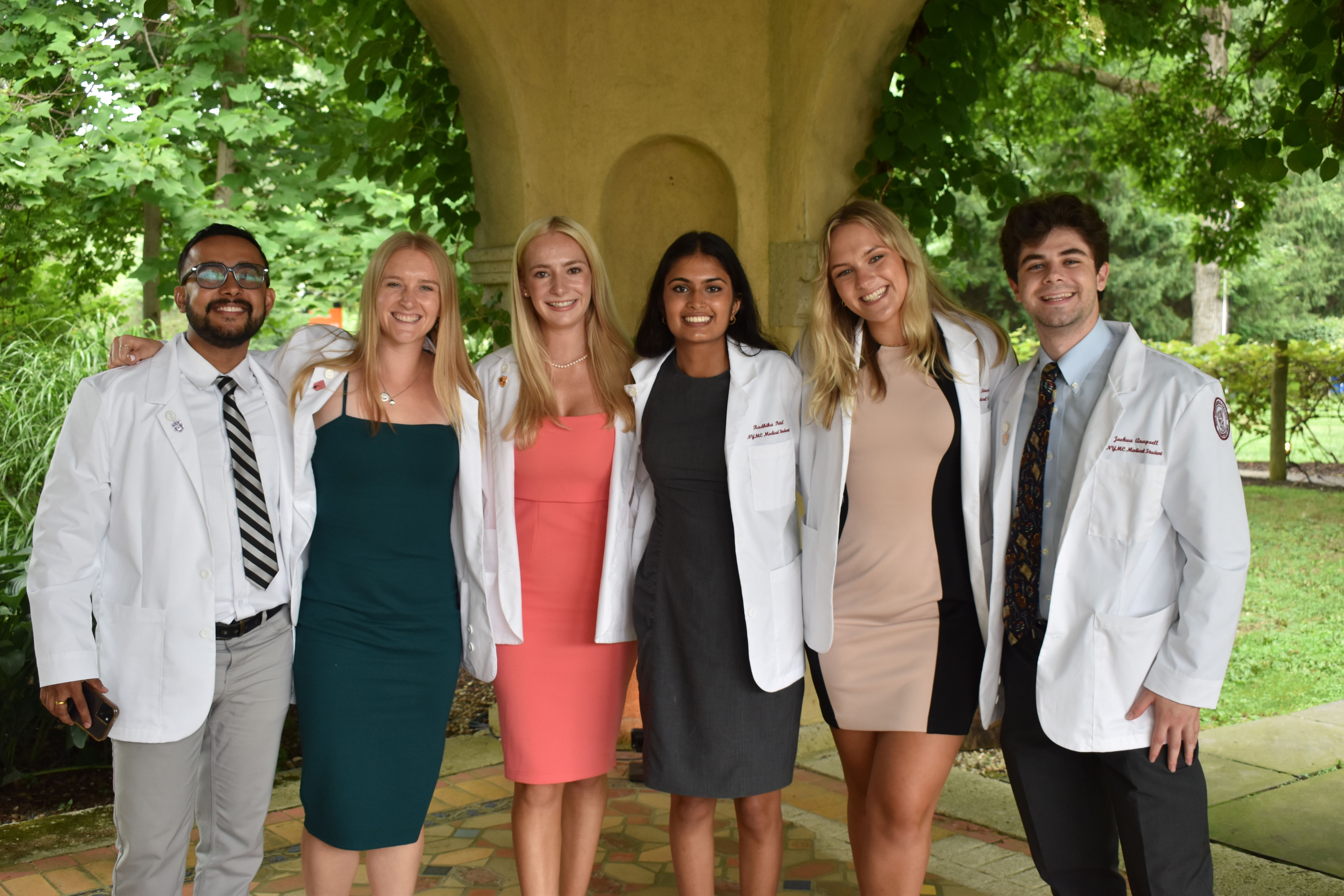
School of Medicine Class of 2028 Marks Start of Medical School Journey
First-Year Students Don Their White Coats for the First Time During the Annual White Coat Ceremony

Members of the School of Medicine (SOM) Class of 2028 marked their first significant moment as medical students at New York Medical College (NYMC) during the annual White Coat Ceremony on July 24. Taking place on the beautiful grounds of Caramoor Center for the Music and the Arts in Katonah, New York, the ceremony is an annual tradition for SOM first-year students during which they don their white coats for the first time and pledge an oath they developed as a class to emphasize the professional and humanistic qualities of a physician they consider most important.
Throughout the ceremony, members of the NYMC community offered their advice to the 219 first-year medical students as they embarked on their medical school journey.
“The new chapter you are starting will thoroughly challenge you in ways you might not expect but I’m reminded of the quote by author Louisa May Alcott: ‘I am not afraid of storms, for I am learning how to sail my ship.’ Today I encourage you to use every storm you may encounter in the next four years as a way to learn how to one day become a better physician, a more empathetic one, a more resilient one, and a more competent one.,” said Angelique Boyer, SOM Class of 2025
“As NYMC students, you are now part of a long line of trailblazers and go-getters who stood up for what they believed in and took action to push for positive change in the community and in medicine. You are here today because we all believe that you all embody the spirit of our school leaders and are full of ideas on how to promote humanism and innovation in medicine,” said Michelle Li, SOM Class of 2025. “At NYMC, it’s not a question of whether we can or cannot do something, it’s a matter of how we as a campus community can support you in getting there. I think I speak for everyone here when I say we are so excited to see you grow into the physicians that you are meant to be.”
“If you see a patient in the emergency room, the ICU, the operating room, or at the bedside, all you should see is a human being—regardless of where that person was born, what languages he or she speaks, who they love, who they pray to, if they pray, whatever they feel about the politics of the day, if they’re a Yankees fan or a Mets fan—and you should treat all your patients as no more and no less than that—a human being worthy of respect, dignity, and the highest possible standard of medical care,” said Neil W. Schluger, M.D., SOM dean. “If you had to choose for yourself a role model for those values, I suggest that you look no further than our keynote speaker, David Asprinio, M.D., professor and chair of the Department of Orthopaedic Surgery.”
During his inspiring speech, Dr. Asprino spoke of the late Arnold Gold, M.D., the pediatric neurologist who established the first White Coat Ceremony at Columbia University in 1993, and the significant challenges Dr. Gold faced in becoming a physician, including prejudice against members of the Jewish faith, likening it to his own father’s experience.
“Prejudice in the 1940s and 1950s was not restricted to members of the Jewish faith. My father’s story is remarkably similar,” said Dr. Asprinio. “He too faced challenges in gaining acceptance to a U.S. medical school. In one interview at an Upstate New York medical school, he was told that the school generally accepted one Catholic for admission each year and that being of Italian heritage it was unlikely to be him. Ultimately, he was accepted [to a medical school in Italy] and became, to my admittedly biased observation, a highly competent and compassionate physician. I mention these stories and this history because NYMC has since its inception been at the forefront of inclusivity.”
Then addressing the SOM’s newest aspiring physicians directly, he offered his sage advice. “Certainly, your accomplishments will be recognized by many and you will be held in high esteem…,” he continued. “I hope however that you allow others to be impressed and to recognize your accomplishments and don’t become too impressed by yourselves. You are training to do a job. It is an important job that comes with great responsibility, however, others have different jobs that also have great responsibility… What I believe will separate you from your peers who have pursued other careers is the selfless manner in which you will approach each and every patient interaction.”
“I feel comfortable sharing with those here that I am a very competent technician,” said Dr. Asprinio. “The technical component of what I do is only a small part of what my professional activities as a physician entail and for me the easiest part. Much more important for me and for those of you who choose to become proceduralists are the interactions I have with my patients. Your patients will have a story to tell but you need to listen.”
“In many cases, the job you do [as a physician] will affect a multitude of individuals in addition to the patient in question. It is an awesome responsibility and I thank you for taking it on. Others will be thankful and impressed…. I implore you once again to not be overly impressed by what you do or what you have become. Maybe, when you retire, you too can be impressed.”

